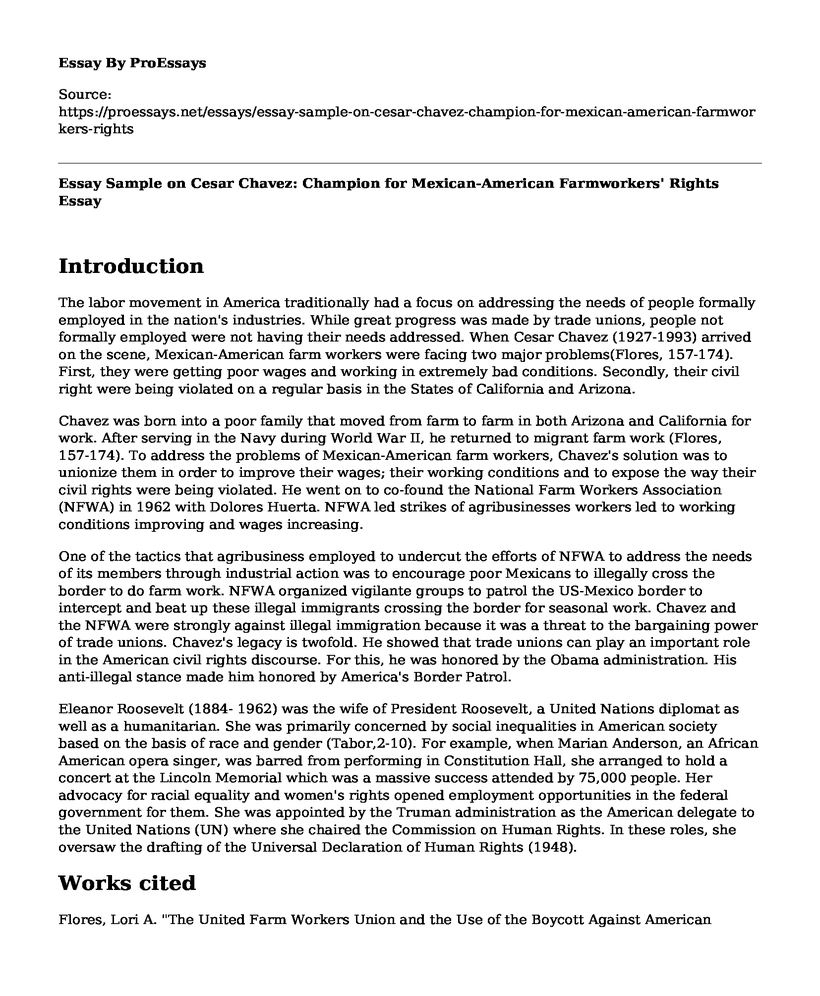Introduction
The labor movement in America traditionally had a focus on addressing the needs of people formally employed in the nation's industries. While great progress was made by trade unions, people not formally employed were not having their needs addressed. When Cesar Chavez (1927-1993) arrived on the scene, Mexican-American farm workers were facing two major problems(Flores, 157-174). First, they were getting poor wages and working in extremely bad conditions. Secondly, their civil right were being violated on a regular basis in the States of California and Arizona.
Chavez was born into a poor family that moved from farm to farm in both Arizona and California for work. After serving in the Navy during World War II, he returned to migrant farm work (Flores, 157-174). To address the problems of Mexican-American farm workers, Chavez's solution was to unionize them in order to improve their wages; their working conditions and to expose the way their civil rights were being violated. He went on to co-found the National Farm Workers Association (NFWA) in 1962 with Dolores Huerta. NFWA led strikes of agribusinesses workers led to working conditions improving and wages increasing.
One of the tactics that agribusiness employed to undercut the efforts of NFWA to address the needs of its members through industrial action was to encourage poor Mexicans to illegally cross the border to do farm work. NFWA organized vigilante groups to patrol the US-Mexico border to intercept and beat up these illegal immigrants crossing the border for seasonal work. Chavez and the NFWA were strongly against illegal immigration because it was a threat to the bargaining power of trade unions. Chavez's legacy is twofold. He showed that trade unions can play an important role in the American civil rights discourse. For this, he was honored by the Obama administration. His anti-illegal stance made him honored by America's Border Patrol.
Eleanor Roosevelt (1884- 1962) was the wife of President Roosevelt, a United Nations diplomat as well as a humanitarian. She was primarily concerned by social inequalities in American society based on the basis of race and gender (Tabor,2-10). For example, when Marian Anderson, an African American opera singer, was barred from performing in Constitution Hall, she arranged to hold a concert at the Lincoln Memorial which was a massive success attended by 75,000 people. Her advocacy for racial equality and women's rights opened employment opportunities in the federal government for them. She was appointed by the Truman administration as the American delegate to the United Nations (UN) where she chaired the Commission on Human Rights. In these roles, she oversaw the drafting of the Universal Declaration of Human Rights (1948).
Works cited
Flores, Lori A. "The United Farm Workers Union and the Use of the Boycott Against American Agribusiness." In Boycotts Past and Present. Palgrave Macmillan, 2019: 157-174.
Tabors, Christy. "A Voice for the Least of These: Eleanor Roosevelt's Servant Leadership." Servant Leadership: Theory & Practice 5.1 (2018): 2-10
Cite this page
Essay Sample on Cesar Chavez: Champion for Mexican-American Farmworkers' Rights. (2023, Jan 14). Retrieved from https://proessays.net/essays/essay-sample-on-cesar-chavez-champion-for-mexican-american-farmworkers-rights
If you are the original author of this essay and no longer wish to have it published on the ProEssays website, please click below to request its removal:
- Advocating for Social Justice
- United Nations Assistance in Afghanistan Essay
- Imprisonment: Ancient Times to Modern Day - Essay Sample
- Criminal Justice Reform: A Case Study of Cambodian Implementation of Legal and Judicial Reform
- Essay Example on Technology and Privacy: Big Brother Is Watching?
- Female Delinquency: Neglected & Different Development - Essay Sample
- Texas Death Penalty Flawed: The Case of Willingham - Essay Sample







